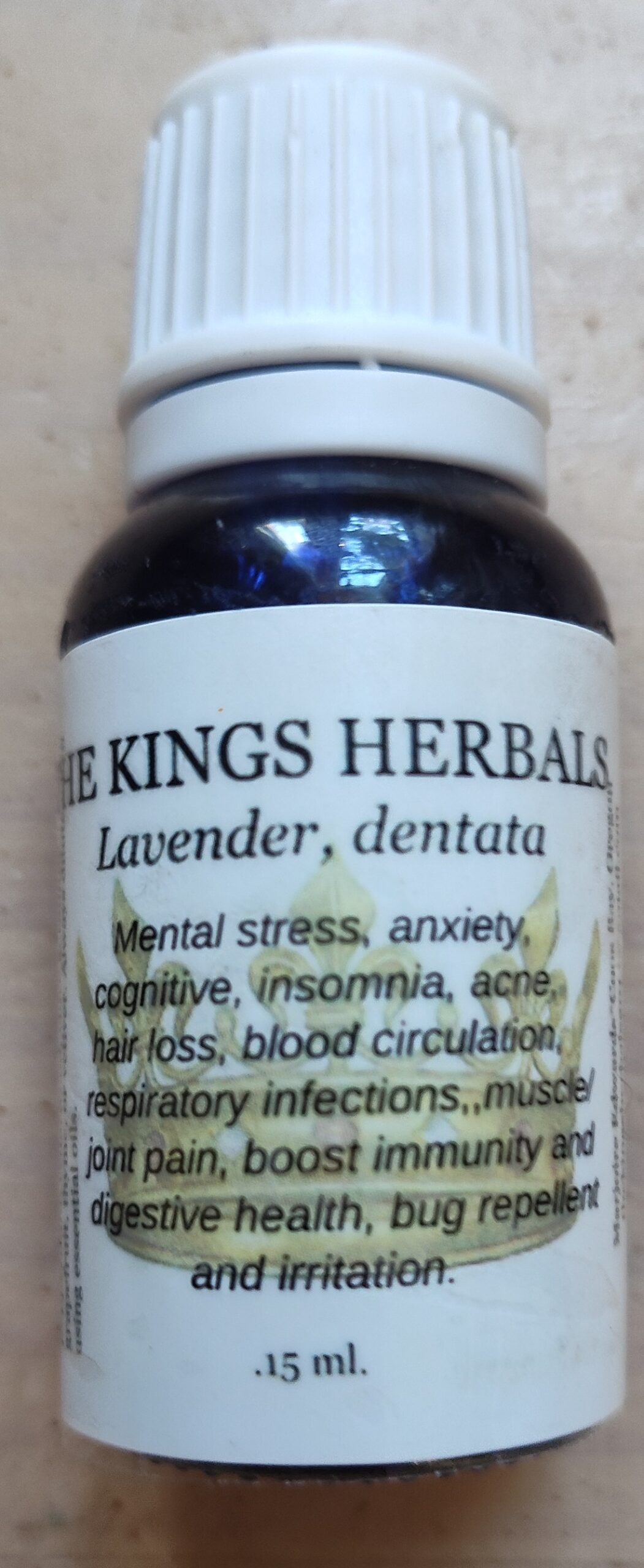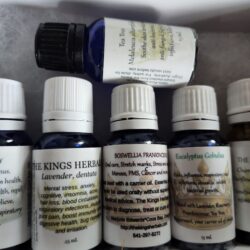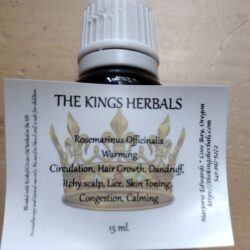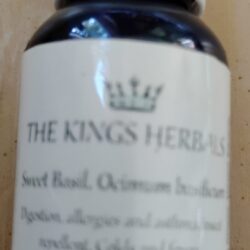Description


1. Anxiety Reduction
Lavender has been shown to have calming effects on the nervous system, which may help reduce symptoms of anxiety. Research suggests that inhaling lavender essential oil or using it in aromatherapy can decrease anxiety levels. For example, studies have demonstrated that lavender oil can have a mild anxiolytic (anxiety-reducing) effect, comparable to some anti-anxiety medications, but without the same risk of side effects.
- Aromatherapy: Diffusing lavender essential oil in a room or using it in a bath is one common way people utilize its calming effects.
- Topical Use: Lavender oil diluted with a carrier oil can be applied to pulse points or used in massage to alleviate stress.
-
Cognitive Clarity and Focus
While lavender is most often used for relaxation, it can also help enhance focus and mental clarity in certain situations. A small amount of lavender may improve concentration and cognitive performance, particularly in high-stress environments. Some studies suggest that lavender’s calming effects may help improve attention and reduce mental fatigue.
-
Research and Evidence
Scientific studies have provided some evidence for the mental health benefits of lavender, but it’s important to note that much of the research is still ongoing. In particular, studies have demonstrated positive effects in:
- Reducing symptoms of generalized anxiety disorder (GAD).
- Alleviating symptoms of depression.
- Improving quality of sleep in those suffering from sleep disturbances.
However, lavender is not a cure-all and may not work for everyone. It should be used in conjunction with other mental health strategies, such as therapy, medication, or lifestyle changes, depending on individual needs.
-
Methods of Use
- Aromatherapy: Using a diffuser, inhalation, or applying diluted essential oil to pulse points.
- Tea: Drinking lavender tea is a gentle way to experience its calming effects.
- Baths: Adding a few drops of lavender essential oil or a lavender bath bomb to a warm bath can provide relaxation and stress relief.
Conclusion
Lavender can be a helpful natural aid for managing stress, anxiety, and sleep-related issues, though it should not replace professional mental health care when necessary. It is generally safe for most people, but as with any herbal remedy, it’s important to consult with a healthcare provider, especially for those with allergies or existing medical conditions. Its versatility and gentle nature make it a useful addition to an overall wellness routine for mental health.
- Read more to find research about how Lavender, as well as other essential oils can help: ADHA, Autism, Down’s
Lavender’s soothing and calming properties have sparked interest in its potential benefits for a range of neurodevelopmental and cognitive conditions, including ADHD (Attention Deficit Hyperactivity Disorder), Autism Spectrum Disorder (ASD), and Down Syndrome. While research on the effects of lavender in these specific areas is still limited, there are some promising findings and general insights into how lavender may help in managing symptoms associated with these conditions.
Lavender and ADHD (Attention Deficit Hyperactivity Disorder)
ADHD is characterized by symptoms such as inattention, hyperactivity, and impulsivity. Many individuals with ADHD struggle with regulating emotions and maintaining focus, which can lead to difficulties in daily life.
Potential Benefits of Lavender for ADHD:
- Calming Effect: Lavender is known for its ability to promote relaxation and reduce anxiety, which may help children and adults with ADHD who experience heightened anxiety, agitation, or restlessness. This could lead to a reduction in impulsivity and better emotional regulation.
- Improved Sleep: Sleep disturbances are common in individuals with ADHD. Lavender’s sleep-inducing properties may help improve sleep quality and duration, which in turn can support better focus and overall functioning during the day.
- Focus and Attention: Some studies suggest that the calming effects of lavender may help increase concentration and mental clarity by reducing stress or overstimulation. A more relaxed state may support cognitive focus in individuals with ADHD.
Research:
A study in 2013 published in the Journal of Child and Adolescent Psychiatric Nursing found that lavender aromatherapy helped reduce anxiety in children with ADHD. While more studies are needed to establish lavender’s direct impact on ADHD symptoms, its role in improving anxiety, sleep, and general emotional regulation could be beneficial.
Lavender and Autism Spectrum Disorder (ASD)
Autism Spectrum Disorder (ASD) is a neurodevelopmental condition characterized by difficulties with social interaction, communication challenges, and restricted or repetitive behaviors. Individuals with autism may also experience heightened sensory sensitivities and difficulties in managing anxiety or stress.
Potential Benefits of Lavender for Autism:
- Reducing Anxiety: Anxiety is a common challenge for individuals with ASD, and lavender’s calming effects may help manage stress and anxiety. Aromatherapy with lavender has been shown to reduce anxiety levels in various populations, which could be particularly helpful for individuals with autism who may become overwhelmed in social or unfamiliar environments.
- Calming Sensory Overload: Many individuals with autism are hypersensitive to sensory input. The gentle scent of lavender might help provide sensory relief in overwhelming environments, promoting relaxation and comfort.
- Sleep Support: Like ADHD, sleep problems are also common in individuals with autism. Lavender’s sedative properties could improve sleep patterns, making it easier to fall asleep and maintain a restful sleep cycle.
Research:
Some small studies and anecdotal evidence suggest that lavender may help reduce anxiety and agitation in children with autism. In 2016, a study published in Frontiers in Psychology explored the use of aromatherapy for anxiety in children with ASD. The findings suggested that lavender essential oil might reduce anxiety and improve emotional well-being when used in aromatherapy. However, more robust research is needed.
Lavender and Down Syndrome
Down Syndrome (DS) is a genetic condition caused by an extra copy of chromosome 21, leading to intellectual disabilities, developmental delays, and potential health issues like heart defects and hearing problems. Individuals with Down syndrome may experience a range of challenges, including behavioral issues, anxiety, and sensory sensitivities.
Potential Benefits of Lavender for Down Syndrome:
- Relaxation and Stress Relief: Lavender’s ability to calm the nervous system may help reduce irritability, aggression, and anxiety that can sometimes occur in individuals with Down syndrome, especially in new or stressful situations.
- Sleep Support: Many individuals with Down syndrome experience sleep disturbances, and lavender’s sedative properties may help promote better sleep hygiene and restfulness.
- Mood Regulation: Lavender’s potential mood-stabilizing effects could support emotional regulation and contribute to an overall sense of well-being, particularly in those who experience heightened emotional responses.
- Cognitive Support: While there is no direct evidence suggesting that lavender improves cognitive function in individuals with Down syndrome, its general calming effects might reduce stress or overstimulation, which could allow for better focus and engagement in daily activities.
Research:
There is limited research specifically linking lavender to Down syndrome, but studies on the use of lavender to address behavioral issues, anxiety, and sleep disturbances in neurodevelopmental disorders suggest that it could be a useful adjunct for individuals with DS, especially for those dealing with anxiety or irritability.
How Lavender Can Be Used
For individuals with ADHD, autism, or Down syndrome, lavender can be incorporated in a variety of gentle and non-invasive ways:
- Aromatherapy: Diffusing lavender essential oil in a room or using a calming lavender spray may be effective for creating a peaceful environment. It can help reduce overstimulation, aid in relaxation, and promote sleep.
- Lavender Oil in Baths: A warm bath with a few drops of lavender essential oil (diluted in a carrier oil) can help soothe the body and mind, making it a calming bedtime ritual.
- Lavender Sachets or Pillows: Placing lavender sachets or using pillows infused with lavender can help promote relaxation and a sense of calm during daily activities or sleep.
- Topical Use: Diluted lavender essential oil can be applied to pulse points or massaged into the skin to reduce anxiety or promote relaxation, but it should always be done cautiously to avoid skin irritation (ensure proper dilution).
- Lavender Tea: For older children or adults, lavender tea can be a gentle, calming drink to support relaxation, although care should be taken to monitor for any allergic reactions.
Considerations and Cautions
- Allergic Reactions: Some individuals may be allergic or sensitive to lavender. It’s important to perform a patch test before using lavender oil on the skin, and to ensure there are no sensitivities to the scent or plant.
- Dosage: Lavender essential oil is potent, so it should always be diluted when applied topically. When using aromatherapy or baths, a few drops are usually sufficient.
- Consultation with Healthcare Providers: Before using lavender as a treatment for symptoms related to ADHD, autism, or Down syndrome, it is important to consult a healthcare provider to ensure that it is a safe and appropriate option, especially if the individual is on medication or has other health concerns.
Conclusion
Lavender has potential as a complementary treatment for individuals with ADHD, autism, and Down syndrome, primarily due to its calming, anxiety-reducing, and sleep-enhancing properties. While more research is needed, lavender can be a helpful tool in managing stress, promoting relaxation, and improving sleep in individuals with these conditions. However, it should always be used as part of a comprehensive treatment plan and in consultation with a healthcare provider.






